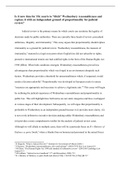Is it now time for UK courts to “ditch” Wednesbury reasonableness and
replace it with an independent ground of proportionality for judicial
review?
Judicial review is the primary means by which courts can scrutinise the legality of
decisions made by public authorities. There are currently three heads of review: procedural
unfairness, illegality, and irrationality.1 This essay argues that proportionality should replace
irrationality as a ground for judicial review. Wednesbury reasonableness, the measure of
irrationality,2 matured in a legal ecosystem where English law did not subscribe to rights-
protective international treaties nor had codified rights in the form of the Human Rights Act
1998 (HRA). When both conditions emerged, Wednesbury reasonableness proved less
advantageous than proportionality which was forged in an environment alongside such
factors. Wednesbury provides a threshold for unreasonableness which, if surpassed, would
render a decision unlawful.3 Proportionality was developed in European courts to ensure
“measures are appropriate and necessary to achieve a legitimate aim.”4 This essay will begin
by outlining the judicial experience of Wednesbury reasonableness and proportionality in
public law. This will highlight how both terms are not static categories and have overlapped
at various stages of their development. Subsequently, we will argue that proportionality is
preferable to Wednesbury as an independent ground because it (i) provides more clarity, (ii)
is not overly deferent to executive decision-making unlike Wednesbury reasonableness and
(iii) provides a more comprehensive toolkit for the analysis of judicial review cases.
Although we will allude to multiple cases, there will be a particular focus on R v Ministry of
Defence ex parte Smith,5 where a blanket ban on homosexual personnel in the armed forces
1
R Hogarth, “What is Judicial Review?” Institute for Government (9 March 2020) 1
2
S Parsons, “Wednesbury unreasonableness, alive and kicking?” (2020) 7874 New Law Journal 18
3
M Elliott, “The Human Rights Act 1998 and standard of substantive review” (2001) 60 Cambridge Law
Journal 313
4
M Fordham, “Judicial review handbook” (7th edn Bloosmbury 2004) 721
5
R v Ministry of Defence, ex parte Smith and others [1996] 1 All ER 256; [1996] QB 517
, was unsuccessfully challenged because the policy was deemed to be within the ambit of
rational decisions available to a legislator. This essay maintains the Court would not have
arrived at this regressive decision had a proportionality analysis been available.
We begin by outlining the experience the courts have had in applying proportionality
within public law.6 Although proportionality has normatively been a fixture of English Law
for centuries,7 it was not seen as an appropriate tool for judicial review until more recently.
Prior to the ascension of proportionality, Wednesbury reasonableness dictated much of the
judicial competence that proportionality has encroached upon. Wednesbury created a high
threshold for unreasonableness. Under the standard, “an action must be so unreasonable, that
no reasonable authority could ever have come to it.” 8 Since 1948, Wednesbury
reasonableness has developed in a piecemeal way to tackle some of its shortcomings. For
example, when it became apparent that Wednesbury was “notoriously difficult to satisfy,”9
the notion of variable intensity was introduced.10 This sentiment was adopted by Laws LJ
who suggested “basic Wednesbury is by no means hermetically sealed. There is a sliding
scale of review, the graver the impact of the decision on the individual affected by it, the
more substantial the justification will be required.”11 Similarly, Lord Bingham,12 in Smith,
stated “the greater the policy content of a decision, and the more remote the subject matter
from ordinary judicial experience, the more hesitant the court must be in holding a decision
to be irrational.”13 Thus, judicial contextualism14 had moved Wednesbury reasonableness
6
As requested in “Public Law II, Material for Stage 2 of Coursework, Summative Component” 1
7
J Jowell “Proportionality in the United Kingdom”, Revue General du Droite, Etudes et Reflexions (2018) 3
8
Associated Provincial Picture Houses Ltd v Wednesbury Corporation (1948) 1 KB [229] (Lord Greene)
9
Lord Sumption, “Anxious Scrutiny” Administrative Law Bar Association Annual Lecture (4 November 2014)
10
R v Secretary of State for the Home Departement Ex parte Bugdaycay [1987] AC 514 (Lord Bridge)
11
R (Mahmood) v Secretary of State for the Home Department [2001] UKHRR 307, [2001] 1 WLR 840 [19]
12
Although this essay uses the title “Lord” in-text, during Smith his title was “Sir Thomas Bingham MR”, which
is reflected in the citations
13
Smith (n5) [556] (Sir Thomas Bingham)
14
M Cohn, “Legal Transplant Chronicles: The Evolution of Unreasonableness and Proportionality Review of
the Administration in the United Kingdom” (2010) 58 American Journal of Comparative Law




